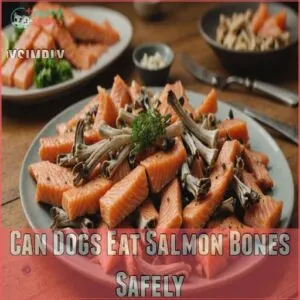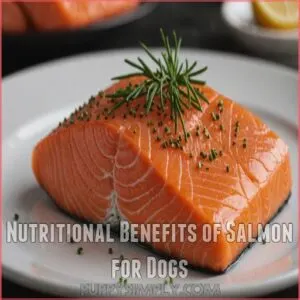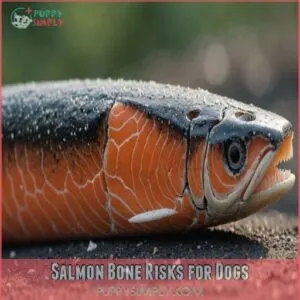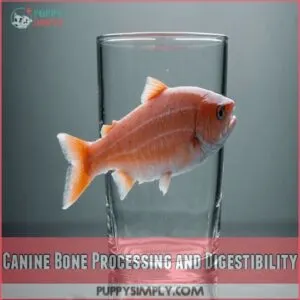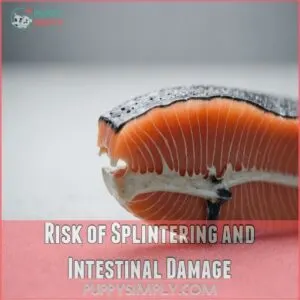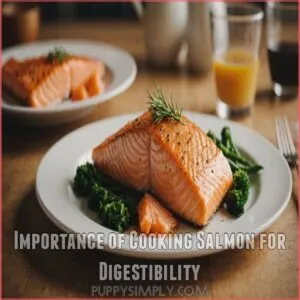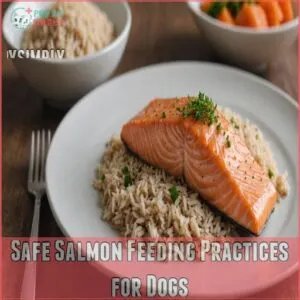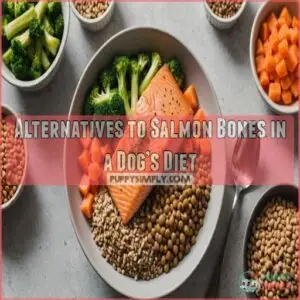This site is supported by our readers. We may earn a commission, at no cost to you, if you purchase through links.
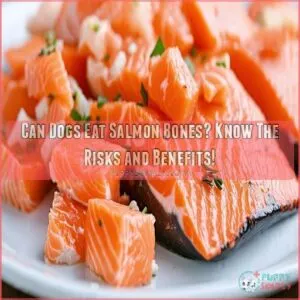 You’re probably wondering, can dogs eat salmon bones?
You’re probably wondering, can dogs eat salmon bones?
Sadly, they shouldn’t.
Salmon bones are tiny and sharp, much like little ninja stars, ready to cause havoc in your pup’s digestive system.
Cooked bones can splinter, leading to serious injuries, while raw ones might introduce unwanted bacteria.
Always remove all bones when treating your dog to this fishy delight.
You might think of salmon as a fantastic protein source rich in omega-3s, but it’s best served bone-free for dogs.
If you’re considering adding fish to your dog’s diet, it’s essential to choose safe options like salmon, which provides high-quality protein and omega-3 fatty acids as discussed in Benefits of Fish for Dogs. If you’re still curious about other safe ways to include salmon in your dog’s diet, there’s plenty more to fish out!
Table Of Contents
- Key Takeaways
- Can Dogs Eat Salmon Bones Safely
- Nutritional Benefits of Salmon for Dogs
- Salmon Bone Risks for Dogs
- Canine Digestive System and Salmon Bones
- Safe Salmon Feeding Practices for Dogs
- Breeds Prone to Digestive Issues With Salmon Bones
- Alternatives to Salmon Bones in a Dog’s Diet
- Frequently Asked Questions (FAQs)
- Can dogs eat boneless salmon?
- Is fresh salmon safe to eat?
- Can dogs eat raw salmon?
- Can dogs eat salmon heads?
- Can a dog eat fish with bones?
- Why do dogs eat salmon?
- What part of salmon can dogs not eat?
- Is it okay to eat cooked salmon bones?
- Are salmon bones digestible?
- What do I do if my dog ate salmon?
- Can dogs have allergic reactions to salmon?
- How can I tell if salmon is fresh?
- Is smoked salmon safe for dogs?
- Do dogs prefer salmon over other fish?
- How often can dogs eat salmon treats?
- Conclusion
Key Takeaways
- Never feed your dog salmon bones; they’re a choking hazard and can cause internal injuries.
- If you give your dog salmon, make sure it is cooked and completely boneless.
- Salmon is a healthy treat in moderation, but always check with your vet before adding new foods to your dog’s diet, especially if they have pre-existing conditions.
- While salmon offers nutritional benefits, there are many other safe and healthy protein sources you can offer your dog.
Can Dogs Eat Salmon Bones Safely
Feeding your dog salmon bones might seem like a fishy treat, but caution is key to avoid health risks.
Removing small bones and making sure they’re not raw or undercooked helps prevent choking and intestinal issues.
Risks of Raw or Undercooked Salmon Bones
Feeding your dog raw or undercooked salmon bones can be as hazardous as giving them turkey necks with bacteria, which can pose serious health risks. Feeding your dog raw or undercooked salmon bones can spell trouble.
The risks include salmon poisoning, bacterial contamination, and the frightening possibilities of choking hazards or intestinal obstruction.
Just like cooked chicken bones pose a severe choking hazard risk, imagine dealing with sharp splinters that can wreak havoc in their digestive tract.
While dogs may seem like invincible little warriors, it’s best not to
Importance of Removing Small Bones and Scales
Those pesky small bones and scales in salmon can spell trouble for your dog’s digestive system.
If you aren’t careful, they could become choking hazards or cause health risks.
Safe preparation involves careful bone removal, ensuring your furry friend can enjoy salmon without worry.
Think of it as doing a little bone detective work for your dog’s well-being!
Potential for Intestinal Blockage or Choking Hazards
You’re probably wondering about salmon bones for dogs after realizing how tiny bits can stick around. Bone size, shape, and even the dog’s size come into play. Watch for breed risks and choking signs to avoid dog digestive issues or intestinal blockage.
Stay alert to:
- Bone shape matters
- Check dog size compatibility
- Know breed risk factors
- Watch for choking signs
- Monitor digestibility
Nutritional Benefits of Salmon for Dogs
Salmon offers your dog some amazing nutritional perks!
It’s packed with protein for strong muscles, omega-3s for a shiny coat, and even vitamin B12 for a healthy brain – who wouldn’t want that for their furry friend?
Omega-3 Fatty Acids and Skin Health
Can salmon bones work wonders for dog health?
While bones can pose risks, omega-3 fatty acids in salmon shine a positive light.
They tackle dry skin issues and nurture coat health, making Fido’s fur shimmer like a summer pond.
Consider omega-3 supplements and salmon oil benefits for tackling skin allergies.
Just like that, your dog’s skin health jumps to the front row!
Protein and Muscle Tissue Benefits
After omega-3 boosts your dog’s coat, about salmon’s protein punch.
This lean protein powerhouse supports muscle growth and repair, keeping your pup fit and strong.
A well-rounded dog diet can include salmon protein as a key ingredient.
So, next time you consider treats, remember salmon’s role in dog nutrition for robust dog health.
Vitamin B12 and Brain Health
Salmon is packed with vitamin B12, important for supporting your dog’s brain health and preventing cognitive decline.
It’s particularly beneficial when combined with other essential nutrients like DHA, which can be found in puppy food for brain development.
Think of it as a brain booster for Fido, keeping mental health in check and aiding brain development.
By including salmon in your dog’s diet, you’re keeping mental
Salmon Bone Risks for Dogs
When considering salmon bones for your dog, remember they can create more trouble than treasure.
With risks ranging from choking hazards to bacterial infections, it’s important to supervise your furry friend and seek veterinary advice if needed.
Choking Hazards and Intestinal Damage
You might think dog’s love for salmon bones is harmless, but tiny bones often spell trouble.
Whether cooked or raw, these can cause choking hazards or intestinal damage.
Pay attention to signs of obstruction like vomiting or lethargy.
Certain breeds show more susceptibility, so always get veterinary advice.
Keep those paws out of harm’s way with bite-sized safety!
Bacterial Infections and Parasites in Raw Salmon
Choking risks aside, raw salmon presents a minefield of bacterial infections.
Dog salmon bones can harbor nasty surprises like Salmonella or parasites causing salmon poisoning disease. It’s like offering a ticking time bomb wrapped in fish. Prioritize food safety to avoid raw fish risks.
- Salmon poisoning disease can be fatal
- Raw salmon bones invite bacteria
- Parasites pose danger
- Safe options exist
- Better safe than sorry
Importance of Supervision and Veterinary Advice
Raw salmon’s a risky business; those bones can harbor nasty bacteria.
So, always supervise your pup when they’re enjoying a salmon treat.
Better safe than sorry, right?
If you’re unsure about salmon bone safety for your dog, a vet visit is the best way to go.
Vet guidance guarantees your dog’s health and happiness.
They can advise on safe portion sizes and alternatives, keeping your furry friend healthy and happy.
Remember, your dog’s well-being is paramount!
Canine Digestive System and Salmon Bones
You might think your dog’s stomach is a bone-crushing powerhouse, but salmon bones can cause trouble in their digestive system.
While raw bones might splinter, leading to serious risks, cooking them can enhance digestibility and safety.
Canine Bone Processing and Digestibility
Salmon bones and a dog’s digestion are a bit hit-or-miss.
Dogs process bones differently based on:
- Bone size: Smaller bones are risky.
- Bone type: Raw salmon bones are softer.
- Digestion time: Varies by dog breed.
- Chewing behavior: Affects bone safety.
Navigating canine nutrition can feel like a puzzle, keeping dog bone health top priority.
Risk of Splintering and Intestinal Damage
Imagine your dog’s digestive adventure with salmon bones: quite the journey!
Those pesky bones can splinter, turning a tasty treat into a risky escapade.
Splintered bones cause intestinal damage, leading to blockages and health scares.
Big or small, cooked or raw, salmon bone dangers lurk.
Remember, bone size matters for every dog breed.
Keep their bone health excellent and avoid nasty surprises.
Importance of Cooking Salmon for Digestibility
Regarding your dog’s health, cooking salmon is a must.
Raw salmon bones can wreak havoc on their digestive system, posing risks like splintering and blockages.
Cooking makes salmon easier for dogs to digest, safeguarding them from salmon bone risks.
So, make sure to go cooked, not raw, ensuring salmon safety and providing tasty dog treats.
Safe Salmon Feeding Practices for Dogs
When you’re feeding salmon to your dog, stick to cooked, boneless options to keep them safe and healthy.
Avoid seasonings, as they can be toxic.
Portion control is essential to prevent any tummies from getting too fishy.
Preparing Salmon for Dogs: Cooked Vs. Raw
Fido’s digestive system needs you to make safe choices.
Raw salmon can house harmful parasites, while cooked salmon eliminates those risks.
Always go for cooked, boneless salmon for your furry friend’s safety.
Think of it like picking the safest playground—avoid raw salmon bones that may splinter.
Your dog will thank you, and you’ll rest easy knowing they’re safe.
Portion Control: How Much Salmon Can Dogs Have
Treat your pup to salmon responsibly.
You can also explore various products related to dog salmon bones, such as those found in salmon bone treats, to mix up their snack routine.
Safe intake depends on your dog’s size.
Smaller dogs need less, larger dogs a bit more.
A good rule of thumb? A few pieces per week, never exceeding
Avoiding Seasonings and Toxic Ingredients
Avoiding seasonings and toxic ingredients is key when feeding your dog salmon.
Garlic, onions, and butter may enhance your dinner but can harm your furry friend.
Additionally, it’s important to weigh the nutritional benefits and risks of raw salmon skin, such as its high omega-3 fatty acid content and potential parasite risks explained in raw salmon skin safety.
Chocolate, too, is a
Breeds Prone to Digestive Issues With Salmon Bones
Some dog breeds, like Miniature Schnauzers and Shetland Sheepdogs, are more prone to digestive issues with salmon bones due to risks like pancreatitis.
Puppies, older dogs, and those with pre-existing conditions also struggle, making salmon bones a tricky treat.
Miniature Schnauzers, Shetland Sheepdogs, and Pancreatitis
Miniature Schnauzers and Shetland Sheepdogs, charming as they are, often face pancreatitis risks because of their dietary predispositions.
High-fat foods, like salmon bones, can trigger this painful condition.
Your best bet? Stick to a customized dietary management routine.
Talk with your vet to guarantee pancreatitis prevention.
Keep your pups healthy, and they’ll wag their tails in gratitude!
Puppies and Older Dogs: Weaker Digestive Systems
Puppies and older dogs have fragile digestive systems, much like a delicate ballet routine that can easily falter.
Their gentle digestion means salmon bones could spell trouble.
While their puppy diet and senior dog care are important, focus on foods that promote smooth digestive system development.
Avoid risky choices that may lead to food sensitivities, keeping your furry friend safe and happy.
Dogs With Pre-Existing Medical Conditions
So, you’ve learned about puppies and older dogs, but what about those with medical issues? Dogs suffering from allergies or gastrointestinal disorders face risks with salmon bones. For dogs with salmon bone allergies, consider exploring specialized dog food options, such as salmon bone allergy dog food. Remember:
- Dietary restrictions: Always consider a
Alternatives to Salmon Bones in a Dog’s Diet
If you’re worried about salmon bones, there are plenty of fish and non-fish options to explore for your dog’s diet.
Explore these alternatives, and don’t forget to chat with your vet to tailor the perfect meal plan!
Other Fish Types Suitable for Dogs
Knowing which breeds are sensitive to salmon bones is important.
But what about other fish?
Luckily, there are options!
Sardines, mackerel, and tuna are good choices, packed with omega-3s.
Remember, always cook and debone fish before giving it to your furry friend.
This makes sure safe and delicious treats for your dog, whether they’re a puppy, senior, or somewhere in between.
Always check with your vet, especially for dogs with allergies or specific dietary needs, before making any changes to their diet.
Safe fish choices are vital for your pet’s health.
Non-Fish Protein Sources for Dogs
While fish like sardines and tuna offer variety, don’t overlook the power of non-fish protein sources.
You can find a range of safe and nutritious options at online stores that specialize in the best dog food.
Chicken, beef, lamb, and turkey are hearty alternatives that guarantee your pup doesn’t miss out on essential nutrients.
Even veggie options can pack a
Consulting With a Veterinarian for Guidance
Choosing non-fish proteins, like chicken or beef, offers variety, but you might wonder about safe salmon portioning.
For personalized insight into salmon bone alternatives and canine digestive health, consulting with a veterinarian is worth its weight in gold.
They’ll help you understand breed-specific risks and manage dog food allergies, ensuring you’re a responsible pet owner safeguarding your dog’s health.
Frequently Asked Questions (FAQs)
Can dogs eat boneless salmon?
You can feed your dog boneless salmon as a tasty treat.
It’s packed with omega-3s and protein but make sure it’s cooked well and unseasoned.
Avoid raw salmon to dodge any nasty parasites or health issues.
Is fresh salmon safe to eat?
Savory, succulent salmon is often safe if it’s fresh and stored properly.
However, watch for signs of spoilage like an off smell or slimy texture.
When in doubt, cook thoroughly to nix any nasty bacteria or parasites.
Can dogs eat raw salmon?
Nope, raw salmon’s a no-go for your pup! It can contain parasites causing serious illness. Stick to cooked, boneless salmon for a healthy, tasty treat. Always consult your vet first!
Can dogs eat salmon heads?
Imagine this: your dog’s health is like a fine-tuned machine.
Feeding salmon heads might upset the gears.
They’re packed with bones that can splinter, posing choking risks.
Always opt for boneless salmon to keep tails wagging safely.
Can a dog eat fish with bones?
Fish bones aren’t safe for dogs.
They can splinter and cause serious injuries like choking or digestive tract damage.
To play it safe, stick with boneless, cooked fish.
Your dog will thank you for it!
Why do dogs eat salmon?
Dogs love eating salmon because it’s packed with omega-3 fatty acids, protein, and vitamins, which boost their skin, coat, and overall health.
It’s like nature’s tasty nutritional package, helping them stay active and healthy!
What part of salmon can dogs not eat?
Hold your horses—dogs shouldn’t eat salmon bones or raw skin.
These parts are dangerous due to the risk of splintering and parasites.
Always opt for cooked, boneless salmon to keep your furry friend safe and sound.
Is it okay to eat cooked salmon bones?
You shouldn’t eat cooked salmon bones.
They can splinter easily and pose a choking hazard or cause injury to your digestive tract.
It’s best to stick with boneless salmon for a safe and delicious meal.
Are salmon bones digestible?
Retro-style advice: salmon bones aren’t fully digestible and can pose a risk for dogs.
These bones may splinter, causing injury or blockages.
Avoid giving them to your furry friend to keep their digestive system happy and safe.
What do I do if my dog ate salmon?
Did your dog eat cooked, boneless salmon? Great! If raw, or if they’re acting strangely, call your vet. They can advise you best. Don’t panic, but be proactive!
Can dogs have allergic reactions to salmon?
Some dogs can have allergic reactions to salmon, showing symptoms like itching, swelling, or digestive upset.
If your dog shows these signs, consult your vet for advice.
It’s vital for their health and happiness.
How can I tell if salmon is fresh?
Think of fresh salmon as the ocean’s gift, gleaming like a silver coin.
Check for bright, clear eyes, firm texture, and a mild odor.
If it smells fishy, toss it back to the sea.
Is smoked salmon safe for dogs?
Smoked salmon isn’t safe for dogs because it often contains high levels of salt and spices that can harm them.
Salmon is a great source of protein and omega-3 fatty acids for dogs, but it’s important to choose the right kind.
Instead, treat your pup with plain, cooked salmon to avoid any fishy business with their health.
Do dogs prefer salmon over other fish?
Dogs might enjoy salmon because of its tasty flavor and rich omega-3 content, but preferences vary.
Some dogs might prefer other fish like sardines or mackerel.
It’s best to observe your dog’s reactions to different fish.
How often can dogs eat salmon treats?
It’s not like your pup’s training for a salmon-eating contest!
Offer them salmon treats about twice a week, ensuring it doesn’t exceed 10% of their daily calories.
Balance is key to keeping them tail-waggingly healthy.
Conclusion
Wondering if your dog can eat salmon bones is like asking if they should munch on ninja stars. It’s a no-go!
While salmon is a great protein option packed with omega-3s, bones pose serious risks.
These tiny, sharp dangers can cause choking or intestinal damage.
Raw or undercooked salmon can pose serious health risks to your pup, including salmon poisoning disease risks. Instead, safely prepare salmon by cooking and deboning it.
Your pup will thank you with wagging tails and healthy skin.
Always seek veterinary advice for dietary changes—playing it safe keeps tails wagging!
- https://www.fda.gov/food/environmental-contaminants-food/mercury-levels-commercial-fish-and-shellfish-1990-2012
- https://www.medicalnewstoday.com/articles/320838
- https://petshun.com/article/can-dogs-eat-salmon-bones
- https://www.petmd.com/dog/nutrition/can-dogs-eat-salmon
- https://www.journeysmobilevet.com/can-dogs-have-salmon/

